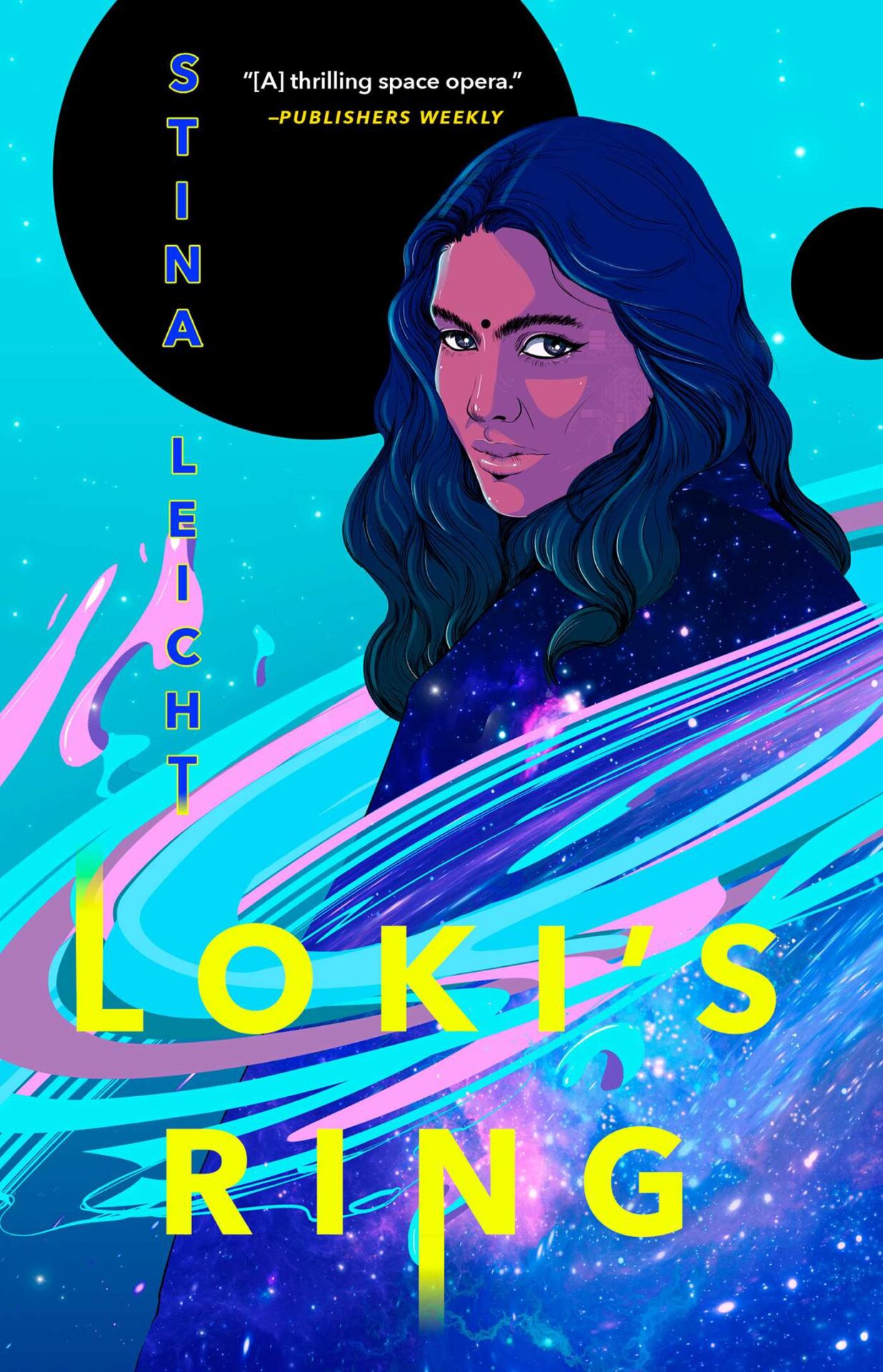
Stina Leicht is joining us today to talk about her novel, Loki’s Ring. Here’s the publisher’s description:
Gita Chithra, the captain of the intergalactic ship The Tempest, is used to leading her crew on simple retrieval and assistance missions. But when she receives a frantic distress call from Ri, the AI she trained from inception—making her like a daughter to Gita—she knows she’s in for something much more dangerous.
Ri is trapped in the depths of Loki’s Ring, an artificial alien-made solar system, and says everyone in the vicinity has been infected and killed by a mysterious contagion. Gita and her team investigate, only to discover horrors at every turn, and are soon stranded themselves, leaving them vulnerable to infection and attack.
Forced to call on an old friend to help them out of this mess, Gita must succeed or risk losing everyone she’s ever loved.
What’s Stina’s favorite bit?

Stina Leicht
“I think hard times are coming, when we will be wanting the voices of writers who can see alternatives to how we live now, and can see through our fear-stricken society and its obsessive technologies, to other ways of being. And even imagine some real grounds for hope.” — Ursula K. Le Guin
When I started writing space opera I couldn’t help thinking of the last public speech Ursula Le Guin gave before her passing. If I wanted to write about hopeful futures, then I needed to learn about a variety of government systems—ones that were different from what I was familiar with. Therefore, I had to explore life beyond late stage capitalism. As luck would have it, my nephew has a degree in political theory. So I gave him a call. It’s led to a number of fascinating conversations. When we talked about Plato’s Republic it inspired a couple of great concepts. The one I’m writing about is related to Plato’s idea that a group of philosopher-guardians should lead because they would uphold the principles of courage, moderation, wisdom, and justice, and therefore, keep society on a good, sustainable path.
As it happens, I was searching for something useful for the artificial persons in the novel to do. If they were to be full citizens of the Republic of Worlds, then they had to have representation within the government. It would also be important for them to serve their community.
Early Science Fiction theorized that artificial persons\ would be free from emotion and therefore, their actions would be logic centered and bias-free. This would instantly bring about a more egalitarian universe. Tada! Utopia! Of course, we now know that you can’t create an artificial intelligence without bias as long as systemic prejudice exists within the society creating it.*
Nonetheless, that was when my question became: what if artificial intelligences were Plato’s philosopher-guardians? What if they were able to provide an ethical check for governmental actions? And that is how I arrived at a possible future government partnered with a Council of Artificial Persons whose purpose was to guard against the inevitable corruption of powerful human leaders. The machines aren’t in charge of humanity—no more than the US Supreme Court is. They point out issues as they arise and provide moral guidance.
And from there we get to my favorite bit in Loki’s Ring: a State Department employee, Agatha (Aggie) Neumeyer and her artificial personal assistant, Cricket. It amuses me that there’s a former spy whose job requires a certain moral ambiguity to achieve the goals of her department being saddled with what amounts to an ethical babysitter. In my opinion, it’s more fun to operate with restrictions than without—or at least, more creative and certainly more interesting for the reader. The only downside is that the two of them didn’t get as much page-time as I would’ve liked. Nonetheless, it’s the bit that makes me smile and the part I’m not sure anyone will notice.
*Although the popular term is AI (Artificial Intelligence) I prefer not to use it because AI doesn’t mean what most people think. It’s an algorythm or a program with a limited function. It’s designed for one thing. Whereas an artificial person would have the capability to do thousands of things and is what the industry calls an AGI (Artificial General Intelligence.) However, my editor insisted I use the term AI in Loki’s Ring because that’s what the public understands. (Yeah. Yeah. I can still grumble about it.)
**See The Alignment Problem by Brian Christian, Weapons of Math Destruction by Cathy O’Neil
LINKS:
Loki’s Ring universal book link
BIO:
Stina Leicht is a science fiction and fantasy writer living in central Texas. Her second novel, And Blue Skies from Pain, was on the Locus Recommended Reading list for 2012. She was an Astounding Award for Best New Writer finalist in 2011 and in 2012. In 2011, she was also shortlisted for the Crawford Award. She is also the author of Loki’s Ring.
